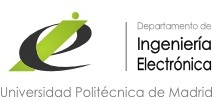Microelectronics (MCRE)
The subject "Microelectronics" has a twofold purpose. On the one hand, is a natural extension of the subject "Design of Electronic Circuits and Systems", mandatory in the second cycle, such that it allows continuing the training of Telecommunication Engineers who want to pursue a specialty in electronics or a good complement to future software engineers who wish to have a more complete system vision (hardware-software). On the other hand, it is sufficiently close to the interest of the "microelectronic" engineers more focused on technologies, processes and devices, addressing requirements of circuits and systems that make use of these technologies.
Indeed, systems engineers attending this course will deepen into the design aspects of "embedded systems", especially digital (application specific integrated circuits, ASICs "), extending training from predifused networks ("gate arrays") or standard-cell based design to full custom design, and supplementing it with vital issues such as test or encapsulated. The emphasis will be on dealing with methods to facilitate the handling of the inherent complexity of these systems.
As regards the "microelectronic" engineers, this course will provide the next step to the device, which will be the focus of the second cycle of the degree. Thus, an engineer who has a good understanding of processes and devices, can understand in depth how the circuits are made from the devices, their features, models, constraints, etc.. This will provide an excellent complement to their main training, while it expands the professional field.
In short, this course aims to provide future designers of hardware or software systems or microelectronic engineers a vision and covering the design aspects of systems to the physical layout, through their circuits and building blocks, mainly focusing on CMOS technology, which is the most used today for the application circuit design. It will also ensure a basic introduction to structures and technological processes necessary in the work of design of integrated circuits.
1. Electronic integrated circuits and systems. (0.2 crd.)
Microelectronics and complexity
Representation of circuits and systems
Design Process
Alternatives and trends
2. Basic devices. The MOS transistor and its models. (0.1 crd.)
3. Basic CMOS manufacturing processes. Design Rules. (0.5 crd.)
4. Basic digital circuits. (1.4 crd.)
Switching Logic
Static and dynamic logic
Combinational and sequential circuits
Memories and array structures
5. Characterization of the circuit: parameters estimation and their limitations. (0.6 crd.)
Resistance capacity
Speed, delay
Excitation of large capacities
Power consumption
6. Digital subsystems. (0.4 crd.)
7. Timing. (0.6 crd.)
Synchronous circuits and self-timed
Generation and distribution of the clock signal
8. Engineering of the chip. (0.4 crd.)
Floorplan (chip planning)
Input-Output Structures
Package
9. Integrated Circuit Test. Design for test. (1.0 crd.)
Ad-hoc techniques
Structured techniques: LSSD, scan, macro-test
10. Designing a complex digital system. (0.8 crd.)
La evaluación de la asignatura se realizará a través de un examen escrito de naturaleza marcadamente práctica. En él el alumno, con o sin la utilización de textos de consulta o apuntes según los casos, deberá resolver problemas, diseños o cuestiones basados en los aspectos desarrollados en clase. Asimismo podrá realizar algunos trabajos prácticos o ejercicios de carácter optativo.

